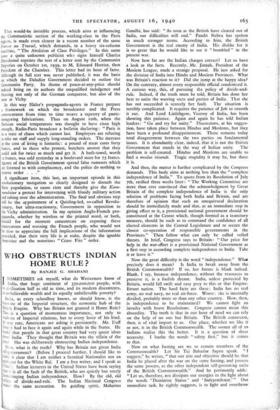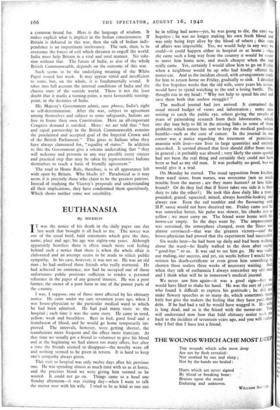WHO OBSTRUCTS INDIAN HOME RULE ?
By RANJEE G. SHAHANI
1r SOMETIMES ask myself, what do Westerners know of 1 India, that huge continent of 350,000,000 people, with its civilisation half as old as time, and its modern discontents, its unbelievable wealth and its equally unbelievable poverty? India, as every schoolboy knows, or should know, is the keystone of the Imperial structure, the economic hub of the British Empire. Why has Britain not granted it Home Rule? This is a question of momentous importance,. not only to students of Imperial relations, but to every lover of his kind. At any rate, Americans are asking it persistently. Mr. Duff Cooper had to face it again and again while in the States. He found that people in that great country had very queer ideas about India. They thought that Britain was the villain of the piece. She was deliberately obstructing Indian independence. Now, what is the truth? Why has Britain not given India self-government? (Before I proceed further, I should like to make it clear that I am neither a fanatical Nationalist nor an aPologist for the White Raj. I am a free writer, and I speak as !find) Indian lecturers in the United States have been saying that it is all the fault of the British, who are quietly but surely hamstringing Indian independence. How? By the old, old Policy of divide-and-rule. The Indian National Congress makes the same accusation. Its guiding spirit, Mahatma Gandhi, has said: " As soon as the British have cleared out of India, our difficulties will end." Pandit Nehru has spoken in much stronger terms. According to him, the British Government is the real enemy of India. His dislike for it is so great that he would like to see it " humbled " in the present war.
Now how far are the Indian charges correct? Let us have a look at the facts. Recently, Mr. jinn* President of the Moslem League, made a strange proposal. He just asked for the division of India into Hindu and Moslem Provinces. What was Britain's reaction to it? Did she jump at the happy idea? On the contrary, almost every responsible official condemned it. A curious way, this, of pursuing the policy of divide-and- rule. Indeed, if the truth must be told, Britain has done her best to unite the warring sects and parties of India. That she has not succeeded is scarcely her fault. The situation is terribly complicated. It requires the patience of Job to smooth it out. And Lord Linlithgow, Viceroy of India, has been showing this patience. Again and again he has told Indian leaders: "Go and try for unity." Discussions, at his sugges- tion, have taken place between Hindus and Moslems, but they have been a profound disappointment. There remains today total disagreement between the two parties on fundamental issues. It is abundantly clear, indeed, that it is not the British Government that stands in the way of Indian unity. The problem is self-created. Hindus and Moslems are unable to find a modus vivendi. Tragic stupidity it may be, but there it is.
And then, the matter is further complicated by the Congress demands. This body aims at nothing less than the " complete independence of India." To quote.from its Resolution of July 7th, ratified three weeks later: " The Working Committee are more than ever convinced that the acknowledgment by Great Britain of the complete independence of India is the only solution of problems facing both India and Britain, and are therefore of opinion that such an unequivocal declaration should be immediately Made and that, as an immediate step in giving effect to it, a provisional national government should be constituted at the Centre which, though formed as a transitory measure, should be such as to command the confidence of all elected elements in the Central Legislature and to secure the closest co-operation of responsible governments in the Provinces." Then follow what can only be called veiled threats. In brief, Congress says to Britain: " Our price for help in the war-effort is a provisional National Government as a first step to according complete independence to India. Take it or leave it."
Now the great difficulty is the word " independence." What precisely does it mean? Is India to break away from the British Commonwealth? If so, her future is blank indeed. Blank, I say, because independence, without the resources to preserve it, is a foolish dream. India, unless protected by Britain, would fall swift and easy prey to this or that Empire- Errant nation. The hard facts are these : India has no real army, no real navy, no real air-force. Worse: she is internally divided, probably more so than any other country. How, then, is independence to be maintained? We cannot fight an invader with brave Resolutions. Congress cannot mean this absurdity. The truth is that in our hour of need we can rely on the help of no one but Britain. The British connexion, then, is of vital import to us. Our place, whether we like it or not, is in the British Commonwealth. The sooner all of us Indians realise this the better. It is a question of sheer necessity. I loathe the words " safety first," but it comes to that.
Now on what footing are we to remain members of the Commonwealth? Let Sir Tej Bahadur Sapru speak. " I suggest," he writes, " that our aim and objective should be that India be placed after the war on the same footing, and possess the same powers, as the other independent self-governing units of the British Commonwealth." And he pertinently adds: " Let us, therefore, not dissipate our energies in the fight about the words ' Dominion Status ' and ' Independence." Our immediate task, he rightly suggests, is to fight and overthrow a common brutal foe. Here is the language of wisdom. It makes explicit what is implicit in the Indian consciousness. If Britain is defeated in this war, then the talk of Indian inde- pendence is an impertinent irrelevancy. The task, then, is to overcome the forces of evil which threaten to engulf the world. India must help Britain in a vital and total manner. No solu- tion without that. The future of India, as also of the whole British Commonwealth, depends on the outcome of this war.
-Such seems to be the underlying meaning of the White Paper issued last week. It may appear timid and insufficient to some, but, on the whole, it is fundamentally sound. It takes into full account the internal conditions of India and the chaotic state of the outside world. There is not the least doubt that it marks a turning-point, a most favourable turning- point, in the destinies of India.
His Majesty's Government admit, sans phrase, India's right to self-determination. After the war, subject to agreement among themselves and subject to some safeguards, Indians are free to frame their own Constitution. Here an all-important Congress demand is satisfied. More: we are told that " free and equal partnership in the British Commonwealth remains the proclaimed and accepted goal of the Imperial Crown and of the British Parliament." This gives to Indians what they have always clamoured for, " equality of status." In addition to this the Government give a solemn undertaking that " they will welcome and promote in any way possible every sincere and practical step that may be taken by representative Indians themselves to reach a basis of friendly agreement."
The road to Home Rule, therefore, is to all appearance left wide open by Britain. Who blocks it? Paradoxical as it may seem, it is precisely those who claim to be the greatest patriots. Instead of studying the Viceroy's proposals and understanding all their implications, they have condemned them querulously. Which shows neither sense nor sensibility.



























 Previous page
Previous page